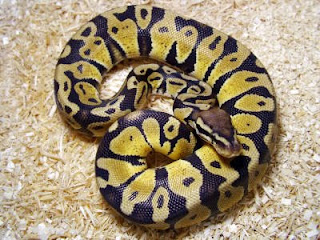. | |
| Albino Nelson Milk snake A gorgeous variety showing the full albino splender of brilliant wide-banded red or red-orange coloration. The extreme intensity of the albino red colour is a result of the naturally occurring shade of cherry red coloration that is unique to L. triangulum sps. from the central west coast lowlands of Mexico. | |
Albino Cali King | |
Californian Striped King
| |
| Pueblan Milk Snake The Pueblan Milk Snakes is a small species growing up to a maximum of 3ft. Although these are small snakes, they make up for this in colour, they are banded with black, white or cream and red body, the head is black, often with a white or cream snout. They make an ideal starter snake and have an excellent temperament. They should definitely be added to any collection, as they are stunning in colour! | |
| Western Hognose - The Western hognose is fast becoming one of the herp keepers favourite snakes, it will never rival the scale that the corn snake is kept, but is very popular in its own right, why you may ask? Its easy to see, once you have had one of these snakes for any length of time how endearing they are! Their cute little noses, their easy going nature and apart from just after very first hatching they feed easily too and are not fussy what they eat. They are also relatively easy to breed! |
iReptile Rescue

- iReptile Rescue
- San Diego, CA, United States
- Well let me try to explain how all this madness started. If I remember correctly (some days were a haze), I grew up in Sunny San Diego, near creaks, mountains, and a lot of run down back yards, so me and my friends would always find our native reptiles, bring them home (without the jefa knowing of course), and risk the consequences for our devious actions =) Well, now as an experienced reptile lover/owner, it opened my heart to open my doors to unwanted reptiles. lately I've seen an increase in abused, neglected, or unwanted reptiles, that, as a reptile lover, directed me to try my best to build a reptile loving community, that i can re-home reptiles that people can't care for anymore. I need all the help and support from all I can, if your a reptile owner, and lover, lets share our thoughts, and open our hearts, to these reptiles that are being let go in valleys, mountains, or given to inexperienced reptile owners.
Saturday, October 31, 2009
Friday, October 30, 2009
Albino Honduran Milk snake
Hypo Honduran Milk snake
Hypo Honduran Milk snake
Hypo Honduran Milk snake
The most sought-after genetic trait available among the multiple colour and pattern morphs of Honduran Milk Snakes. The "Super Hypo" genetic trait combines all of the best features of an extreme version Tangerine Honduran Milk Snake with the hypomelanistic gene.
Jungle Corn Snake
Carolina Corn Snake

Carolina Corn Snakes
(hatchlings, various colour morphs inc, Creamsicle Anerythristic & Snow Corns)
Corn and Rat snakes both belong to the genus Elaphe; Corns belong to the species Elaphe guttata; many of the rat snakes are subspecies of Elaphe obsoleta. For a full list of the Elaphe species, see the EMBL Database: Colubridae: Elaphe.
The Latin word elaphe means deerskin; guttata means speckled or spotted
Reticulated Pythons

Reticulated Pythons are the longest snakes species in the world, reaching up 32 feet. The longest in captivity in the UK is a 22 footer named 'Barney' and is currently housed in the Cotswolds.
Python reticulas is non-venomous python species found in Southeast Asia.
Albino Burmese Python

Albino Burmese Python
The Albino Burmese Pythons start out life as bright orange and yellow on a white background color. As they mature, they become and pastel yellow color. The Albino Burmese was one of the first "investment" reptiles and has now become very affordable to acquire as a pet. These snakes will grow very large, but generally have very gentle and deliberate temperaments.
Royal Python

Royal Python
This species of Python grows to an average length of 4 foot (1.2 m), with the females being the large of the two. Some specimens have been known to reach more than 5 foot (1.5m) in length. Royal Pythons have a distinctive head, slender neck and a wide body. The body colour is black with yellow, gold or brown markings. The patterns may be banded, broken or reduced in some specimens and some may have a dorsal stripe.
Sumatra Blood Python
Brazilian Rainbow Boa
Red Tail Boa
Red Tail Boa
Red tail boas will generally grow to an average length of 7 or 8 feet and can live to ages of 25 to 30 years in captivity. Your actual size will be directly proportional to the amount of feeding.
Blog Archive
-
▼
2009
(39)
-
▼
October
(16)
- . Albino Nel...
- Albino Honduran Milk snake
- Hypo Honduran Milk snake
- Hypo Honduran Milk snake
- Leucistic Rat Snake
- Jungle Corn Snake
- Carolina Corn Snake
- Reticulated Pythons
- Albino Burmese Python
- Royal Python
- Sumatra Blood Python
- Brazilian Rainbow Boa
- Red Tail Boa
- Red Tail Boa
- <!--google_ad_client = "pub-9273596990938548";/* 3...
- Tarantula
-
▼
October
(16)







